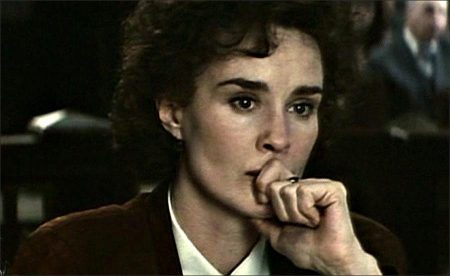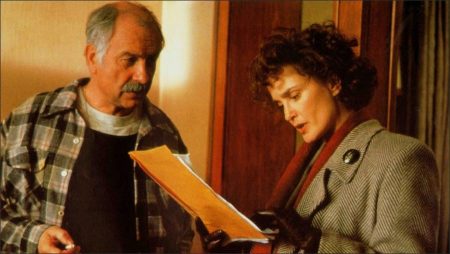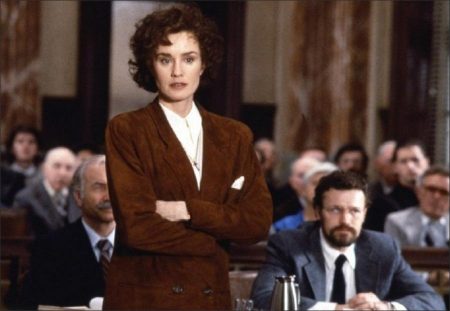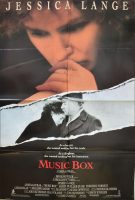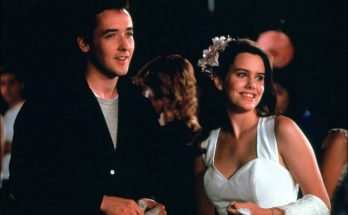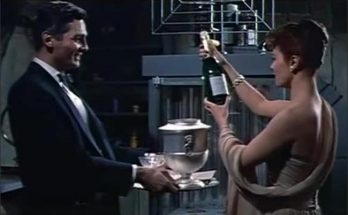Taglines: What do we know about our parents?
Music Box movie synopsis. Chicago defense attorney Anne Talbot learns that her father, Hungarian immigrant Michael J. Laszlo, is in danger of having his U.S. citizenship revoked. The reasons are that he stands accused of war crimes. He insists that it is a case of mistaken identity. Against the advice of her former father-in-law, corporate attorney Harry Talbot, Anne resolves to defend her father in court. One of her reasons is how deeply her son, Mikey, loves and admires his grandfather.
According to prosecuting attorney Jack Burke of the Office of Special Investigations, Michael Laszlo is not, as he claims, a simple political refugee, regular churchgoer, and family man. Rather, he is “Mishka,” the former commander of an Arrow Cross death squad. During the Siege of Budapest, Mishka’s unit sadistically tortured and murdered scores of Hungarian Jews, Gypsies, and their Gentile protectors. To Anne, these allegations are absurd. The loving single father who raised her could not possibly have committed such crimes.
Preparing for her father’s denaturalization hearing in the midst of a media circus puts enormous stress on Anne. Heartbroken and sickened, Anne tells her father that her research into The Holocaust in Hungary has made her feel, “ashamed to be Hungarian.” Her father lovingly replies, “You’re American.”
Later, Jack Burke tells Anne that her father has no conscience, zero empathy, and that his love for his family is a façade. An enraged Anne replies by accusing Burke of murdering his recently deceased wife. Meanwhile, her father’s accounts reveal large payments to a fellow Hungarian immigrant named Tibor Zoldan. Her father claims these were loans to help a destitute friend and which he was unable to repay before his death.
As the hearing unfolds before a Jewish judge named Irwin Silver, the crimes of Mishka’s unit are described in grisly testimony by the few who survived contact with them. All the witnesses identify Anne’s father as the man who tortured them. Equally damning is an Arrow Cross identification card that bears his photograph and the name, “Laszlo Miklos”. An FBI agent initially confirms its authenticity. Her father claims that this is all a frame-up by Hungary’s Communist Government and its secret police, the ÁVO. He says that it is retaliation for his protest against the U.S. tour of a Hungarian ballet troupe several years earlier.
Anne locates a Soviet defector who testifies about the KGB’s forgery of such documents to frame anti-Communists in the West. The defector further explains that this technique was shared with every secret police in the Soviet Bloc. He explains that the Hungarian ÁVO was “very interested” in this tactic. This revelation, combined with Anne’s questioning the reliability of witnesses who still live under a police state, throws Burke’s case into serious doubt.
Music Box is a 1989 American crime drama film that tells the story of a Hungarian-American immigrant who is accused of having been a war criminal. The plot revolves around his daughter, an attorney, who defends him, and her struggle to uncover the truth.
The film was written by Joe Eszterhas and directed by Costa-Gavras. It stars Jessica Lange, Armin Mueller-Stahl, Frederic Forrest, Donald Moffat and Lukas Haas. The film won the Golden Bear at the 40th Berlin International Film Festival.
It is loosely based on the real life case of John Demjanjuk and, as well, on Joe Eszterhas’ own life. Eszterhas learned at age 45 that his father, Count István Esterházy, had concealed his wartime involvement in Hungary’s Fascist and militantly racist Arrow Cross Party. According to Eszterhas, his father, “organized book burnings and had cranked out the vilest anti-Semitic propaganda imaginable.”[2]:201 After this discovery, Eszterhas severed all contact with his father, never reconciling before István’s death.
Music Box (1989)
Directed by: Costa-Gavras
Starring: Jessica Lange, Armin Mueller-Stahl, Frederic Forrest, Donald Moffat, Lukas Haas, Cheryl Lynn Bruce, Mari Töröcsik, Michael Rooker, Elzbieta Czyzewska, Magda Szekely Marburg
Screenplay by: Joe Eszterhas
Production Design by: Jeannine Oppewall
Cinematography by: Patrick Blossier
Film Editing by: Joële Van Effenterre
Costume Design by: Rita Salazar
Set Decoration by: Erica Rogalla
Art Direction by: László Rajk
Music by: Philippe Sarde
Distributed by: TriStar Pictures
Release Date: December 22, 1989
Views: 315
